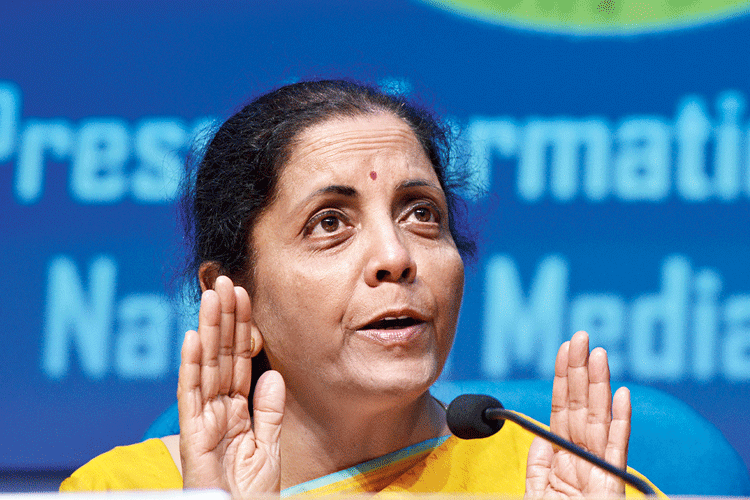Finance minister Nirmala Sitharaman on Saturday peppered her budget speech with catchphrases and shibboleths but her interpretation of some of the government’s slogans evoked befuddlement if not derision.
For instance, she continued to decode “sabka vishwas” in terms of minimising tax disputes, at a time the new citizenship regime has deepened minorities’ insecurities and prompted an explosion of protests countrywide.
When Prime Minister Narendra Modi had at the start of his second term added “sabka vishwas” to his old slogan of “sabka sath, sabka vikas”, it was seen as an indication that a government identified with majoritarian politics was keen on winning “everybody’s trust”.
Sitharaman said the new scheme for redressing tax disputes showed the government’s determination to earn people’s trust.
“In the last budget, (the) Sabka Vishwas scheme was brought in to reduce litigation in indirect taxes…. This year, I propose to bring a scheme similar to the indirect tax Sabka Vishwas for reducing litigations even in the direct taxes,” she said.
She introduced the Vivad Se Vishwas (From Dispute to Trust) scheme and a taxpayer’s charter in an apparent response to the widespread concerns among businessmen about a rising “tax terrorism”.
If her promise of a “caring society” had raised expectations among some of a healing touch to a population fractured by the new citizenship law and police violence on the protesters, these would have been disappointed.
One of the examples she cited under the head “caring society” was the higher enrolment of girls in schools compared with boys. Another was the availability of smart phones among anganwadi workers to upload nutritional data from the villages.
Before an audience that was essentially political, Sitharaman attracted both protest and jeers.
As she attributed the higher school enrolment among girls to the Beti Bachao Beti Padhao scheme, Opposition members hurled questions about the rise in rapes and other sex crimes.
Her claim about improved safety for citizens was met with cries of “Goli maaro” — a slogan her deputy Anurag Thakur had led a Delhi poll rally in chanting recently, and which has been blamed for Thursday’s firing by a youth who described himself as “Rambhakt” on a Jamia Millia Islamia student.
Sitharaman also asserted that official data must have strong credibility — apparently oblivious to the accusations against the government of systematically manipulating and suppressing unflattering statistics on the economy and employment.
Her claim that the nominal GDP growth in 2020-21 would be 10 per cent prompted Opposition members to call it the “best joke” ever heard in Parliament. It is not clear whether the Opposition members factored in the difference between nominal GDP and real GDP.
In a speech high on hyperbole, Sitharaman cited the Sindhu-Saraswati civilisation to stress entrepreneurship in ancient India. This too evoked ridicule, with many Opposition members wondering whether she was giving a history tutorial or offering solutions to contemporary problems.
Instead of ODF (open-defecation-free), the finance minister talked of “ODF Plus”. She called a plan to energise economic activity along the rivers “Arth Ganga”, and an insurance scheme “Nirvik” (Fearless).
As is the ruling dispensation’s wont, sundry claims were presented soaked in nationalist sentiment. One of these was the slogan “TB harega, desh jeetega (Tuberculosis will lose, the country will win)”.
Sitharaman’s stress on an aspirational India contained the astounding claim that today’s youth was no longer a job seeker but a job creator, unmindful that India is grappling with a 45-year-high unemployment rate.
While Sitharaman provided hardly any road map for job creation, she referred to a scheme for internship in urban local bodies.
Quoting Tamil poet-saint Thiruvalluvar, Sitharaman said: “He identified the five jewels of a good country: without epidemic (health), wealth, fertility (a good crop), happiness and security. Prime Minister Modi is working on all these five factors.”
She listed schemes and slogans such as Ayushman Bharat, ease of living, national security and the doubling of farmers’ income and claimed the government trusted every citizen, triggering protests from the Opposition benches.
As Sitharaman’s speech, the longest-ever budget speech but one bereft of concrete action plans, rambled on, the Opposition looked perplexed. But ministers such as Smriti Irani, Ravi Shankar Prasad, Ramesh Pokhriyal and Piyush Goyal were seen dutifully taking notes.
The finance minister, who demonstrated remarkable energy to read on for over 150 minutes without a break, looked exhausted towards the end. She repeatedly drank water and nervously wiped her face.
As the signs of her unease grew, the Prime Minister asked her to end the speech. Sitharaman asked the Speaker to consider the rest of the speech as read before sitting down at 1.45pm, having spoken for two hours and 45 minutes.










